

MOOCs-and-Quality-Literature-Review-15.pdf. 7 Common Mistakes About Open Online Education. Free Online Courses From Top Universities. How MOOCs Could Reform Education Completely by Accident. Back in 2013, the New York Times columnist Thomas Friedman wrote that MOOCs—massive open online courses—were about to change everything: Nothing has more potential to lift more people out of poverty—by providing them an affordable education to get a job or improve in the job they have.
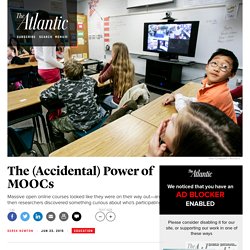
Nothing has more potential to unlock a billion more brains to solve the world’s biggest problems. And nothing has more potential to enable us to reimagine higher education ... MOOCs have since lost their hype, undergoing flameouts and suffering from poor participation and competency rates. A University of Pennsylvania study of 1 million MOOC users who participated in 16 of the school’s Coursera classes, for example, found that only about half of the registrants viewed even a single online lecture and that the average completion rate was just 4 percent. Recent MOOCs I Have Taken & How They Helped Me on the Job. Arts education goes MOOC. The world of massive open online courses is getting a little more creative.
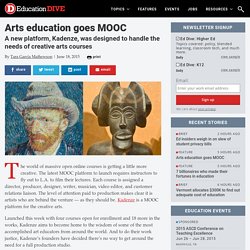
The latest MOOC platform to launch requires instructors to fly out to L.A. to film their lectures. Each course is assigned a director, producer, designer, writer, musician, video editor, and customer relations liaison. The level of attention paid to production makes clear it is artists who are behind the venture — as they should be. Kadenze is a MOOC platform for the creative arts. Launched this week with four courses open for enrollment and 18 more in the works, Kadenze aims to become home to the wisdom of some of the most accomplished art educators from around the world.
“The idea of just putting a camera in the back of a lecture hall or just sitting in your office with a webcam — we want to go way beyond that,” said Ajay Kapur, Kadenze co-founder, associate dean at the California Institute of the Arts, and a senior lecturer at the New Zealand School of Music at Victoria University of Wellington. Online learning is 'the blackboard of the future' - Education News - Education. "Two- and three-year-olds love video games and they're able to play with iPads – all they have to do is wipe their fingers over the keyboard," he said.
"That's happening already in the home and it would be really fun for them to use those skills in the kindergarten," Dr Agarwal, told a seminar organised by the Education Foundation, an education think-tank, during a whistlestop UK tour. His visit includes talks with MPs, the Secretary of State for Education, Michael Gove, and universities minister David Willetts on how Moocs can transform education. He was speaking amid growing scepticism over the impact that Moocs could have on higher education.
In an article in Times Higher Education, Diana Laurilland, of London University's Institute of Education, argued that unsupervised learning online was not the answer. "Free online courses that require no qualifications or fee are a wonderful idea, but not viable," she said. Education, he claims, had been slow to embrace new technology. ‘Biggest-ever Mooc’ starts on FutureLearn. FutureLearn, the UK massive open online course platform, has this week commenced what it believes is the biggest-ever Mooc.
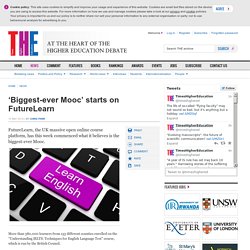
More than 380,000 learners from 153 different counties enrolled on the “Understanding IELTS: Techniques for English Language Test” course, which is run by the British Council. The six-week course is designed to prepare learners for the IELTS English proficiency test. Of those signing up, 55 per cent are female; 41 per cent say they are aged between 18 and 25, with the same proportion aged 25 to 35; and 42 per cent say they are in full-time employment.
Some 21 per cent are in full-time education, while 17 per cent are “looking for work”. Why So Many MOOC Videos Are Utterly Forgettable. The participants of #NumericalMOOC will have noticed that we made only one video for the course.
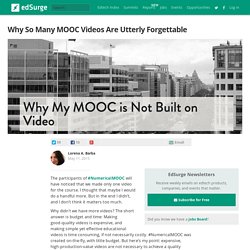
I thought that maybe I would do a handful more. But in the end I didn’t, and I don’t think it matters too much. Arizona State University and edX Reimagine First Year of College, Offer Alternative Entry... WASHINGTON, April 22, 2015 /PRNewswire/ -- Arizona State University and edX, two leaders in interactive online education, announce the Global Freshman Academy, a first-of-its-kind program that offers a unique entry point to an undergraduate degree.
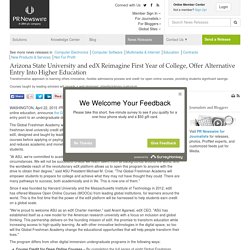
The Global Freshman Academy will give learners anywhere in the world the opportunity to earn freshman-level university credit after successfully completing a series of digital immersion courses hosted on edX, designed and taught by leading scholars from ASU. By allowing students to learn, explore and complete courses before applying or paying for credit, the Global Freshman Academy reimagines the freshman year and reduces academic and monetary stress while opening a new path to a college degree for many students. MIT, Harvard Evaluate Their MOOCs' Impact. Harvard and MIT have issued a report on the effectiveness of their Massive Open Online Courses (MOOCs) offered through MITx and HarvardX free to the public.
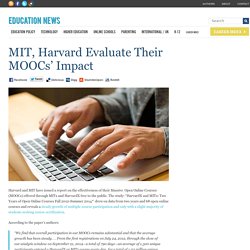
The study: “HarvardX and MITx: Two Years of Open Online Courses Fall 2012-Summer 2014″ drew on data from two years and 68 open online courses and reveals a steady growth of multiple-course participation and only with a slight majority of students seeking course certification. According to the paper’s authors: “We find that overall participation in our MOOCs remains substantial and that the average growth has been steady. . . From the first registrations on July 24, 2012, through the close of our analytic window on September 21, 2014—a total of 790 days—an average of 1,300 unique participants entered a HarvardX or MITx course every day, for a total of 1.03 million unique participants.” Massive Open Online Course (MOOC) Market 2015-2020: mEducation, Distance, Open & e-Learning in Higher Education & Enterprise.
Why MOOC forums fail to deliver. MOOC Sightings 001: UNC and Cornell. Despite wholesale announcements by powerful academic leaders throughout the U.S. that MOOCs are dead, sightings continue to pour in from around the country and the rest of the world.
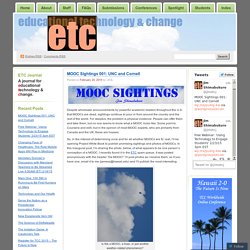
For skeptics, the problem is physical evidence. People can offer them and take them, but no one seems to know what a MOOC looks like. Stanford's 'Hapkit' teaches touch online. By Ron Bethke, eCampus News Assistant Editor, @eCN_RonBRead more by Ronald Bethke February 13th, 2015 A new MOOC on haptics, the science of touch, brings a hands-on element to the world of online learning thanks to a device called the Hapkit.
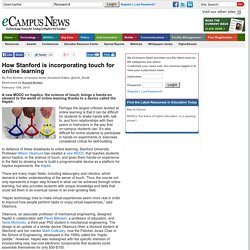
Perhaps the largest criticism leveled at online learning is that it can be difficult for students to shake hands with, talk to, and form relationships with their peers or instructors in the way that on-campus students can. It’s also difficult for online students to participate in hands-on experiments or exercises considered critical for skill-building. In defiance of these drawbacks to online learning, Stanford University Professor Allison Okamura has created a new MOOC that teaches students about haptics, or the science of touch, and gives them hands-on experience in the field by showing how to build a programmable device as a platform for haptics experiments: the Hapkit. Harvard B-school opens the flood gates with online courses.
(Poets&Quants) — After a pair of highly successful pilot runs, Harvard Business School is now opening its online program in business basics to students worldwide.
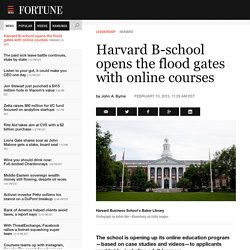
The school is also inviting admitted MBA students to enroll in the program as a pre-MBA boot camp experience, particularly for non-traditional admits or those who need more basic quantitative work before showing up on campus. All told, slightly more than 1,100 students have now taken the primer on the fundamentals of business called CORe (Credential of Readiness) program. In the first beta starting last June, the trio of courses—Business Analytics, Economics for Managers, and Financial Accounting—were open to only undergraduate students attending colleges in Massachusetts and alumni.
Some 600 students took the $1,500 two-month program. U Michigan Launches Residential MOOC on Healthcare Policy. Distance Learning U Michigan Launches Residential MOOC on Healthcare Policy The University of Michigan (U-M) has launched its first residential MOOC with more than 800 undergraduate, graduate and professional students signing up in its first week.
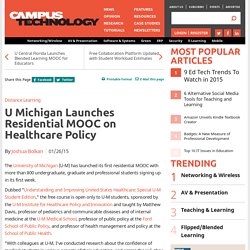
Dubbed "Understanding and Improving United States Healthcare: Special U-M Student Edition," the free course is open only to U-M students, sponsored by the U-M Institute for Healthcare Policy and Innovation and taught by Matthew Davis, professor of pediatrics and communicable diseases and of internal medicine at the U-M Medical School, professor of public policy at the Ford School of Public Policy, and professor of health management and policy at the School of Public Health. "With colleagues at U-M, I've conducted research about the confidence of medical students in various aspects of their education, and across the U.S. they are less confident about health policy than just about any subject they study," Davis said, in a prepared statement.
Iversity - Study Anywhere. Courses. New Udacity Blog: Skills & Resources to Change Your Life! - Udacity - Climb Higher. Welcome to Climb Higher, the new Udacity blog! It’s like our old blog, but better. We’re putting our motto, “Students First,” to work with this new redesign: every change we’ve made is to make it easier for you to find the information and the resources you’re looking for. Whether you want to get on the right path to your dream career, find inspiration, or introduce yourself to new communities of web developers and data scientists, you’re in the right place.
Whatever your passion is – web development, mobile development, data science – you can find the skills that will change your life right here. Learn from Coursera on your next JetBlue flight. Google Basics for Teaching - Course. How Does Coursera Make Money? Coursera is an education platform that partners with top universities and organizations worldwide to offer courses online for free. It was started by two Stanford professors in late 2011. In less than three years it has reached 10 million students around the world and raised $85 million in venture capital. Why have VCs invested so much money in the company? How does offering free online courses generate revenue? Corporate Training Gets an Online Refresh - WSJ. Design and Development of Educational Technology.
To be effective, educational technologies must be designed based on what we know about how people learn. Through interviews with multiple experts in the field, this course examines educational technologies, outlines the theories that influenced their development, and examines their use. The course leads up to a final project – a kickstarter style pitch for a new educational technology - which is worked on iteratively across the weeks. It involves active weekly participation. In week 1, we’ll talk about the history of educational technologies and how they change the way we learn. HandsOn_MOOC_Hoja_eng.pdf.
FINCHANNEL.com - Over 70,000 students start world’s biggest English class. The FINANCIAL -- A record number of people from around the world will be starting a new English class as the British Council launches its new course ‘Exploring English: Language and Culture’, according to British Council. The course will be delivered on the FutureLearn social learning platform, a UK-based provider of Massive Open Online Courses [MOOCs] in the global higher education sector. The British Council’s new MOOC for English language learners has attracted the highest number of registrations for a FutureLearn course to date, and helped the platform reach new global audiences. MOOCs in the Workplace. Has this new online college program solved the MOOC problem?
Courses. XSeries Program. Breaking new ground with Coursera’s first US-based Learning Hub. Dominican University of California offers University of London Understanding Research Methods MOOC MOOC participants at Dominican University of California. MOOC completion rates DO matter. It has become accepted practice amongst those who know about MOOCs to sniff at completion rates. #MassiveTeaching mystery captivates, confuses @insidehighered. (Note: This story is being updated.
Welcome Amber Saloner Tennant as VP of User and Community Operations. Creativity: Music to My Ears. With the power to cross borders and languages, music serves as a compelling tool for unlocking creative potential. Creativity: Music to My Ears is a six week course designed to explore several factors that stimulate creativity in individuals, teams, and organizations.
Georgia Tech Professional Education. Announces New Membership Structure; Expands edx.org. Growing demand from foundations, NGOs, businesses and universities to offer courses on edx.org has prompted the nonprofit to expand its membership model Smithsonian, Linux Foundation, Inter-American Development Bank and Osaka University among new members joining the non-profit online learning community Cambridge, MA – March 6, 2014 – EdX, the not-for-profit online learning initiative composed of the 32 charter members of the xConsortium, today announced a new expanded membership structure that will enable additional universities and colleges, foundations and other global organizations to join the edX community.
Global reach of MOOCs: A comparison of HarvardX and MITx. A MOOC Mystery: Where Do Online Students Go? Register for individual graduate-level computer science courses from Georgia Tech! World Map of Certificate Attainment. ‘Spooky Mooc’ students shun Edge Hill academic credit. FIRST BUSINESS MOOC - WALL STREET. Can peer grading actually work? Reflecting on the MOOC Experience. No MOOCs for Iran or Syria? Welcome to Forbes. New educational technology network wins award. Georgia Tech Launches World's First Massive Online Degree Program. Canvas Network. Courses Online. Education Week. 300 Free MOOCs from Great Universities (Many Offering Certificates)
A free, flexible, nine-week online course that will allow K-16 educators to learn about how deeper learning can be put into practice. MOOCs How ‘open’ are they? (7 dimensions) After Setbacks, Online Courses Are Rethought. The C***** word is the problem! MOOCS and the Future of Higher Education. Global Steel Manufacturer Tenaris Adopts edX Platform for Employee Training. A primer - biggies, newbies & freebooters. Welcome to Forbes. New research offers advice on how to optimize video length for student engagement « MediaCore Blog.
MOOCs, Norway, and the ecology of digital learning. Need-to-Know-News: OERuniversity, ALISON expands open education & MOOC Camp Initiative. U.S. Teams Up With Operator of Online Courses to Plan a Global Network. MOOCs and their discontents - Opinion. Mooc creators criticise courses’ lack of creativity. MOOCs at Fanshawe. FutureLearn — Learning for Life. Two MOOC curriculum announcements in one week. In This Online Psychology Class, the Key Words Are Real Time. REAP > Home. Is this Time Different? Questions for MOOCs and Online Learning Beyond 2012. Stephen Downes: The Role of the Educator. The Most Thorough Description (to date) of University Experience with MOOC. The making of a MOOC at the University of Amsterdam. The Making of a MOOC, College Scorecard and Syllabus Builder Tool.